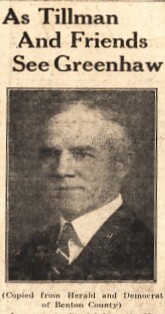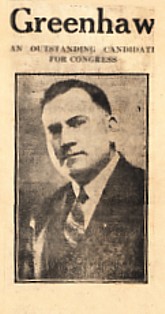|
|
Home Where Cuch played `Tongue of Devil` Is Honored The home where William Ques- enbury (pronounced Cushenberry) the famous "Bill Cuch" of early days, played his violin, wielded his painter's brush and cracked jokes with his famed old associates is to be honored Thursday in an unveil- ing program of the historic site marker placed there. A picture of this building is to be found on page one. Served Under Yell Major Quesenbury served in Company F, First regiment, |
**FAYETTEVILLE IS:** Home of the University of Arkansas which annually reaches more than 5,000 persons with instruction. Home of the Western Methodist Assembly sponsor- ed by 300,000 Methodists of five states. Site for Arkansas' National Cemetery in which are buried victims of the Civil War who wore the Blue, Veterans, G.A.R., World War heroes. Site for Arkansas' Confederate Cemetery wherein sleep her Heroes in Gray. |
|
|
||
| (Copied from Hearld and | Arkansas Volunteers, under Col. | Site of the Battle of Fayetteville | It is not every election that the | |||
| Democrat of Benton County) | Archibald Yell, in the Mexican | one of the bloodiest of the Civil | voters of a Congressional District | |||
| In a recent editorial from the Har- | War. At that time he was company | War. | have the privilege of voting for a | |||
| rison Times, which has all the ear- | bugler. He also was secretary to | Capital of the County of Wash- | candidate for Congressman who is | |||
| marks of having been writen by | General Albert Pike at the time the | ington, 100 years old last year. | as clean, capable and conscient- | |||
| Karl Greenhaw, the argument is | latter perfected a treaty between | Home of the first Masonic | ious as Karl Greenhaw of Boone | |||
| advanced that Judge Tillman and | the Cherokee, Creek, Choctaw | Lodge in Arkansas. | County. He is a young man with | |||
| his friends should not support | and several other Indian tribes, | Site of the world's biggest post | his life before him who is destined | |||
| Claude Fuller for Congress, for the | and the Confederate government | companies. | to make an enviable record of | |||
| reason that Fuller sued Judge Till- | in 1861. A copy of this treaty, | Site of one of the biggest spoke | achievement. He served three | |||
| man and they had a bitter cam- | bearing the signatures of Pike and | plants in the world. | terms as Prosecuting Attorney of | |||
| paign. The article is just a little | Quesenbury, is in the national mu- | Center of the Ozark and North- | this district with much credit to | |||
| short of mud-slinging and egotism. | seum at Washington. | west Arkansas fruit, berry and | himself and left a high record of | |||
| The Harrison Times need not | Was Prince of Wits | canning industries. | proficiency in office. | |||
| worry about Judge Tillman and | In 1854 the Southwest Indepen- | Home of a Garment Factory | One thing that may be said of | |||
| most of his friends being against | dent, which was to gain no little | that has annual payroll of | Greenhaw is that in his practices he | |||
| Greenhaw. The campaign of four | notoriety on account of its bold- | $210,000 and that makes more | does not resort to the nefarious | |||
| years ago is past history, in which | ness and humor, came into being | than a quarter of a million gar- | tactics and chicanery commonly | |||
| many errors were possibly com- | under Quesenbury, editor and | ments a year. | followed by the professional polit- | |||
| mitted by all candidates. | publisher, prince of wits, and | Center of a 7,000 grape acre- | ician. He has loyal supporters by | |||
| There are many reasons that | chief cartoonist of the paper | age from which is expected a | the hundreds all over the district, | |||
| could be advanced as to why | *===========* | million dollar grape crop. | but he has no paid healers, hench- | |||
| Judge Tillman and his friends | OLDEST USED MILL IN U. S. | Center of canning area which | men and bosses looking after his | |||
| would not support Greenhaw. | IN WASHINGTON COUNTY | puts up eight major and minor | interests on a business basis. He is | |||
| Possibly they think Mr. Greenhaw | The mill-stone from Washington | crops a year at estimated | pleading his case before a jury of | |||
| does not start to have the ability of | County's first mill, chiselled out in | income of $1,080,000 and pay- | honest voters. | |||
| Mr. Fuller, or possibly they do not | 1829 by Peter Pyeatt, is still in | roll of $500,000. | Boone county will support | |||
| approve of Greenhaw's war | existence. The stone was used in | Center of a territory shipping | Greenhaw by an overwhelming | |||
| record, or his actions in some in- | the mill below Mark Bean Springs | annually two million and a half | majority. The voters of his home | |||
| stances and his lack of action in | near Cane Hill, which antedated | dollars worth of poultry and | county know him and believe in | |||
| other instances while prosecuting | by many years the present Cane | eggs, that is the oldest shipping | him. He came within a few hundred | |||
| attorney and that he does not | Hill mill, oldest in the United States | point in the state and that sends | votes of being elected before in | |||
| reflect the ideas of the Tillman | still being operated. | to a territory as far away as | spite of the fact that the Democrat- | |||
| supporters. Then, too, they may |
------------------------------- |
South Africa. | ic party in Boone county was split | |||
| conclude that while he openly in | Judge Mitchell's vote of 4000 | Center of a bread-eating terr- | wide open with two primaries and | |||
| his speeches apparently mad a | four years ago came off of Mr. | itory that bakes 4,500 loaves of | another opponent in the race from | |||
| clean canvass two years ago, that | Fuller, while Mr. McFerrin's vote | bread a day. | his home county. Had the Demo- | |||
| quietly he made false statements | of 2400 two years ago came off of | A telephone business center that | cratic vote in Boone County been | |||
| reflecting upon Judge Tillman, and | Judge Tillman. Had McFerrin not | pays an annual phone bill of | united in support of his candidacy | |||
| we predict now, that in his desper- | run two years ago, Mr. Greenhaw | $84,000 of which $32,000 is | two years ago as it is this year, | |||
| ation he will pursue the same old | would not have run within hearing | for long distance calls, mostly | Greenhaw would now be running | |||
| tactics against Mr. Fuller. | distance of Judge Tillman. Besides | business. | for re-election instead of for his | |||
| At any rate this is a new race in | Judge Tillman was really sick in the | A community having a creamery | first term.-Boone County Headlight | |||
| which Mr. Fuller is due to win. All | last race and did not attempt to | with $75,000 gross income and |
*===========* |
|||
| of his former strength, which most- | make a real canvass. | turning out 75 tons of butter, | Everything for your outing. Open | |||
| ly supported Mr. Greenhaw two | The statement that Greenhaw | mostly on student labor. | tonight-closed tomorrow. | |||
| years ago, are back in his camp | will sweep the six lower counties is | Home of the "world's best hard- | Bates Brothers-Picnic Outfitters | |||
| and supporting him to a man. Ben | preposterous. His weakness is in | wood handles, mostly hickory," | ||||
| McFerrin and his friends are again- | these counties. He lost three of | sent by local factory to every | ||||
| st Greenhaw, as is true of 95 per- | them two years ago, while Mr. | portion of the globe. |
*===========* |
|||
| cent of the Mitchell support, | Fuller is strong there and always | Home of A.Z. Vassar, plant |
NOTICE |
|||
| besides a big majority of Judge | carried these counties, and he will | wizard and friend of Burbank, | ||||
| Tillman's friends in these four | this time in addition to the four in | who carries on botanical work | To insure publication letters in- | |||
| counties. | this end of the District. | of interest to all scientists. | tended for the People's column | |||
| The Herald and Democrat, | Home of autoist and radio fans | must avoid personalities. Letters | ||||
| Benton County. | who use 150,000 battery | from the people in constructive | ||||
| chargings a year. | discussion of public matters are | |||||
|
*===========* |
*===========* |
One town that still has a village | received and printed gladly always. | |||
| blacksmith in the heart of its | Letters written in the spirit of | |||||
| business section. | personal criticism will not be | |||||
| CLASSIFIED ADS | Home of two ice plants that | published, nor will anonymous | ||||
| operate six factories in one with | letters be printed. | |||||
| and | a $200,000 annual gross busi- | |||||
| ness and payrolls for from 60 to |
*===========* |
|||||
| Markets | 90 people. | |||||
| Kansas City Produce, Livestock | Site of a Local Glands Products | |||||
| company, only one of its kind in | ||||||
| the South, turning out half a | ||||||
| million "gland-sules" annually. |

